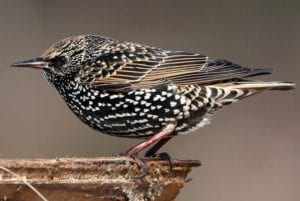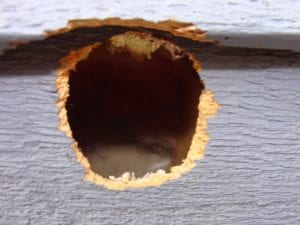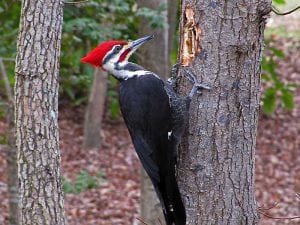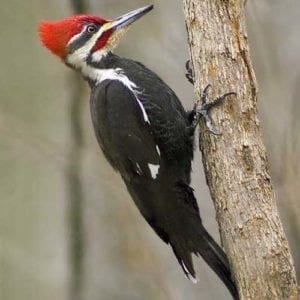by Pigeon Patrol | Apr 1, 2020 | 4-S Gel Bird repellent, Animal Deterrent Products, Bird Deterrent Products, Bird Netting, Bird Spike, Bird Spikes, Pigeon Control, Pigeon Droppings, Pigeon Patrol's Services, Pigeon Spikes, Pigeons in the News, UltraSonic Bird Control
What Are In Starling Droppings? Dropping accumulation under roosts can encourage histoplasmosis fungus to grow in the soil. When disturbed, spores can become airborne, and people can breathe them in. Most people have no apparent ill effects. A few develop respiratory disease and a very few develop disease of other organs.
Histoplasmosis fungus is common to soils in the eastern and central United States. As many as 80 percent of people tested in these areas prove to have already been exposed without knowing. It is important to note that the birds (and bats) associated with this disease don’t carry or spread it; they simply provide the rich nutrients that can allow it to grow and proliferate. Many factors will go into whether or not conditions are right for this as well as how people might become exposed. Certainly soil disturbance plays an important role in risk of exposure.
People diagnosed with histoplasmosis typically work where bird or bat droppings accumulated (poultry farmers, contractors clearing old buildings) or explore caves where bats lived rather than merely live near starling roosts. Despite the very small risk of harm to people, histoplasmosis has been used to justify killing starlings where the nuisance of large roosts annoys people.
Source
At Pigeon Patrol, we manufacture and offer a variety of bird deterrents, ranging from Ultra-flex Bird Spikes with UV protection, Bird Netting, 4-S Gel and the best Ultrasonic and audible sound devices on the market today.
Contact us at 1- 877– 4– NO-BIRD, (604) 585-9279 or visit our website at www.pigeonpatrol.ca
Bird Gone, Pigeon Gone, Seagull Gone, Pigeon issue, pigeon spikes, 1-877-4NO-BIRD, 4-S Gel, Bird Control, Pigeon Control, bird repellent, Bird Spikes, sonic bird repellent, stainless steel bird spikes, bird spikes Vancouver, Ultra Sonic Bird Control, Bird Netting, Plastic Bird Spikes, Canada bird spike deterrents, Pigeon Pests, B Gone Pigeon, Pigeon Patrol, pest controller, pest control operator, pest control technician, Pigeon Control Products, humane pigeon spikes, pigeon deterrents, pigeon traps, Pigeon repellents, Sound & Laser Deterrents, wildlife control, raccoon, skunk, squirrel deterrent, De-Fence Spikes, Dragons Den, Canada bird spikes, Canada pigeon, pigeon control, pigeon patrol, pigeon. Kill pigeons, crow, starling

by Pigeon Patrol | Apr 1, 2020 | 4-S Gel Bird repellent, Animal Deterrent Products, Bird Deterrent Products, Bird Netting, Bird Spike, Bird Spikes, Pigeon Control, Pigeon Droppings, Pigeon Patrol's Services, Pigeon Spikes, Pigeons in the News, UltraSonic Bird Control
You may be looking at this article because you recently have starling problems. In the short article we are going to share with you what are some common solutions for starling problems.
Prevention
It’s best to keep starlings out before they start to build their nest. Ask yourself, “Have they nested in a vent before?” “Is there a cavity on the house they might like?” Seal any openings before they appear and start building. If you discover them building before eggs are laid, remove the nest and appropriately cover the opening they were using.
Sealing openings
Use hardware cloth, metal flashing, or commercial vent covers to seal opening, (the commercially available ones are probably the easiest to work with). Lighter material, such as plastic netting or window screening, rarely keeps determined starlings out. Any vent covering you use for starlings should be checked periodically to make sure the vent is working properly and is not impeded by a build-up of any material, such as lint from a dryer.
Identifying an active nest
You’ll know there are chicks in the nest when you hear the sound of begging nestlings. Active nests are also often marked by a fan-shaped trail of smeared droppings below a corner joint or other entrance to a cavity. Birds using vents make noise that the vent itself tends to amplify. Act right away if you hear scratching and shuffling.
Nests in building cavities and vents
Starlings will use any hole they can get into if it leads to a suitably sized cavity. Dryer, stove, and bathroom vents are ideal. A vent with a metal flap may not deter them: they can hover or perch while raising the flap to get into vents.
Vents with nests inside may not function properly. This can be inconvenient or, in some cases, unsafe. The nesting material may need to be removed immediately.
Sometimes young starlings get caught in vents, falling into open spaces that they can’t escape. This may be especially true of microwave and stove hood exhaust vents. To help a starling out of one of these vents, you may need to remove the hood or microwave, so you might want to call a professional.
If eggs or young are already in the nest, can this vent be left unused until they fledge? If so, treat this nest like a nest in an attic or similar cavity.
Nests in attics and similar cavities
If you find eggs or young birds in attics or similar cavities, leave them be. You may have to wait about 12 days for eggs to hatch and up to 3 weeks for young to leave the nest. Check the nest frequently—once the young leave the nest, remove the nesting material, and seal the openings.
Removing the nest
If young are present in a vent or other space, and there is no option to leave them there until they fledge, the parents can still raise their young in an alternate nest.
- Make a substitute nest from a wicker basket, a plastic gallon jug, or a birdhouse designed for medium-sized woodpeckers.
- Cut an U shape opening in the plastic jug and flip the “door” up to keep rain out.
- Attach the substitute nest as close as possible to the original nest, but in as much shade as possible.
- Carefully remove nesting material and nestlings, and place in substitute nest.
Noisy nestlings usually attract the parents who will continue to care for them. Watch the substitute nest to see that the adults return. They should not take more than a half hour or so, as growing young birds need constant feeding. If the adults do not return to nestlings, contact a wildlife rehabilitator in your area for advice.
Finally and importantly, if it was a vent that you vacated, promptly install a vent cover to keep other starlings, and other birds, out.
Source
At Pigeon Patrol, we manufacture and offer a variety of bird deterrents, ranging from Ultra-flex Bird Spikes with UV protection, Bird Netting, 4-S Gel and the best Ultrasonic and audible sound devices on the market today.
Contact us at 1- 877– 4– NO-BIRD, (604) 585-9279 or visit our website at www.pigeonpatrol.ca for your starling problems.
Bird Gone, Pigeon Gone, Seagull Gone, Pigeon issue, pigeon spikes, 1-877-4NO-BIRD, 4-S Gel, Bird Control, Pigeon Control, bird repellent, Bird Spikes, sonic bird repellent, stainless steel bird spikes, bird spikes Vancouver, Ultra Sonic Bird Control, Bird Netting, Plastic Bird Spikes, Canada bird spike deterrents, Pigeon Pests, B Gone Pigeon, Pigeon Patrol, pest controller, pest control operator, pest control technician, Pigeon Control Products, humane pigeon spikes, pigeon deterrents, pigeon traps, Pigeon repellents, Sound & Laser Deterrents, wildlife control, raccoon, skunk, squirrel deterrent, De-Fence Spikes, Dragons Den, Canada bird spikes, Canada pigeon, pigeon control, pigeon patrol, pigeon. Kill pigeons, crow, starling
by Pigeon Patrol | Apr 1, 2020 | 4-S Gel Bird repellent, Animal Deterrent Products, Bird Deterrent Products, Bird Netting, Bird Spike, Bird Spikes, Pigeon Control, Pigeon Droppings, Pigeon Patrol's Services, Pigeon Spikes, Pigeons in the News, UltraSonic Bird Control
What about starlings? Starlings are cavity nesters and will use vents and ducts in homes to build nests and raise young
European starlings are widespread across North America. They eat a wide variety of foods and are willing to use a wide variety of places to nest and roost. This flexible nature helps them thrive in cities and suburbs as well as on farms. They are one of only a few birds who live in otherwise barren industrial urban wastelands.
Starlings only nest in cavities and are happy to use those provided by people—stove, dryer, and exhaust fan vents, for example—are popular nest sites, along with the bird houses we put up.
But people also complain about starlings getting in the trash. And settling in numbers onto lawns, where they are undoubtedly providing a service by eating insects.
More seriously, large flocks—up to tens of thousands of birds—sometimes roost in urban places where their noise and droppings are extremely unwelcome.
Source
At Pigeon Patrol, we manufacture and offer a variety of bird deterrents, ranging from Ultra-flex Bird Spikes with UV protection, Bird Netting, 4-S Gel and the best Ultrasonic and audible sound devices on the market today.
Contact us at 1- 877– 4– NO-BIRD, (604) 585-9279 or visit our website at www.pigeonpatrol.ca
Bird Gone, Pigeon Gone, Seagull Gone, Pigeon issue, pigeon spikes, 1-877-4NO-BIRD, 4-S Gel, Bird Control, Pigeon Control, bird repellent, Bird Spikes, sonic bird repellent, stainless steel bird spikes, bird spikes Vancouver, Ultra Sonic Bird Control, Bird Netting, Plastic Bird Spikes, Canada bird spike deterrents, Pigeon Pests, B Gone Pigeon, Pigeon Patrol, pest controller, pest control operator, pest control technician, Pigeon Control Products, humane pigeon spikes, pigeon deterrents, pigeon traps, Pigeon repellents, Sound & Laser Deterrents, wildlife control, raccoon, skunk, squirrel deterrent, De-Fence Spikes, Dragons Den, Canada bird spikes, Canada pigeon, pigeon control, pigeon patrol, pigeon. Kill pigeons, crow, starling

by Pigeon Patrol | Apr 1, 2020 | 4-S Gel Bird repellent, Animal Deterrent Products, Bird Deterrent Products, Bird Netting, Bird Spike, Bird Spikes, Pigeon Control, Pigeon Droppings, Pigeon Patrol's Services, Pigeon Spikes, Pigeons in the News, UltraSonic Bird Control
There are top 3 woodpeckers problems 
Woodpecker Problem #1 – The most commonly given reason for woodpeckers hammering on your home is that they are searching for food, however this is NOT correct. Woodpeckers are most likely not searching for food when hammering on your house. If you have wood shingles, you may want to have an inspector look for insect problems, but it is unlikely an insect problem that you have could be a woodpecker food source.
Woodpecker Problem #2 – Woodpeckers are hammering (or drumming) to announce their territory, much like a cardinal singing his song i
in spring. The drumming is loud, but generally not very destructive or as long-lived in duration as the third reason. This is most common in late winter and through the breeding season, i.e. late-February though June.
Solution: This kind of activity can best be stopped by making the drumming site unsuitable for noisemaking. This can be done by covering it with noise-deadening material such as canvas, foam rubber, a sheet, newspaper, heavy plastic, or ¾ inch bird netting attached to the building across the focal area. For specific exclusion methods, see Woodpecker Exclusion Method section below.
Woodpecker Problem #3 – The third reason entails the real “nuisance” issue. It is called excavating (or chiseling) whereby either a male or a female constructs a nest or roost hole with a cavity that would typically be placed in trees. This is the most common cause of damage and can be very destructive. If you see a hole at least 2 inches in diameter, you most likely have a woodpecker that is excavating a nesting cavity. Unfortunately, some woodpeckers try to place such a cavity in the side of a house, barn, utility pole, fence post, or other man-made structure.
Solution: Problems of this nature may be avoided by leaving dead snags or by hanging woodpecker nest boxes. Installing a bird box, much like a bluebird or purple martin box, at the site of excavation with either deter the bird or it will use the box for nesting. Many stores sell bird boxes for those not choosing to build their own. For other exclusion methods, see following section.
Source
At Pigeon Patrol, we manufacture and offer a variety of bird deterrents, ranging from Ultra-flex Bird Spikes with UV protection, Bird Netting, 4-S Gel and the best Ultrasonic and audible sound devices on the market today.
Contact us at 1- 877– 4– NO-BIRD, (604) 585-9279 or visit our website at www.pigeonpatrol.ca
Bird Gone, Pigeon Gone, Seagull Gone, Pigeon issue, pigeon spikes, 1-877-4NO-BIRD, 4-S Gel, Bird Control, Pigeon Control, bird repellent, Bird Spikes, sonic bird repellent, stainless steel bird spikes, bird spikes Vancouver, Ultra Sonic Bird Control, Bird Netting, Plastic Bird Spikes, Canada bird spike deterrents, Pigeon Pests, B Gone Pigeon, Pigeon Patrol, pest controller, pest control operator, pest control technician, Pigeon Control Products, humane pigeon spikes, pigeon deterrents, pigeon traps, Pigeon repellents, Sound & Laser Deterrents, wildlife control, raccoon, skunk, squirrel deterrent, De-Fence Spikes, Dragons Den, Canada bird spikes, Canada pigeon, pigeon control, pigeon patrol, pigeon. Kill pigeons, crow, starling

by Pigeon Patrol | Apr 1, 2020 | 4-S Gel Bird repellent, Animal Deterrent Products, Bird Deterrent Products, Bird Netting, Bird Spike, Bird Spikes, Pigeon Control, Pigeon Droppings, Pigeon Patrol's Services, Pigeon Spikes, Pigeons in the News, UltraSonic Bird Control
How to prevent woodpeckers from damaging your home? Here are some tips on how you can get rid of woodpeckers and other insects near your home if they become problematic and pose high risks.
- Remove prune branches or large trees near your home and on areas where they peck so that they will be encouraged to stay in a thicker cover because they will feel more exposed and vulnerable when you remove the trees. As a result, they will be redirected and will be discouraged to peck your home.
- Provide an easier food source to them instead of allowing them to find insects on your home. Jelly, Suet, and mealworms are some of the food sources that you can consider.
- Give them a ready-made cavity by creating a birdhouse for them, especially if their activity is a prelude to nesting. Place it near or over the area where the pecking has occurred.
- Replace shingles or use wood putty to cover the holes that are already drilled woodpeckers.
- Prevent any insects from invading the weakened area and disguise the site by painting or staining the repair over.
- If the woodpecker activity becomes out of control or insects are already feeding on the wooden structure of your home, it is better for you to hire pest control professionals to inspect your home. Woodpeckers will feed somewhere else if insects will be eliminated.
If these simple redirection strategies still don’t work, here are some stronger way to get rid of them completely:
- Add reflective objects that are bright enough to scare them away. Wind chimes and recorded bird alarms can also help to scare them.
- Wooden areas where they find it attractive to peck can be covered with netting, cloth, or foam. Fishing line or chicken wires can also be added, 1-2 inches away from the surface to keep them from reaching the wooden structure of your home.
- Use decoys such as carved or plastic owls and hawks can also be placed on areas where they are pecking so they can be deterred.
Source
At Pigeon Patrol, we manufacture and offer a variety of bird deterrents, ranging from Ultra-flex Bird Spikes with UV protection, Bird Netting, 4-S Gel and the best Ultrasonic and audible sound devices on the market today.
Contact us at 1- 877– 4– NO-BIRD, (604) 585-9279 or visit our website at www.pigeonpatrol.ca to prevent woodpeckers from damaging your home
Bird Gone, Pigeon Gone, Seagull Gone, Pigeon issue, pigeon spikes, 1-877-4NO-BIRD, 4-S Gel, Bird Control, Pigeon Control, bird repellent, Bird Spikes, sonic bird repellent, stainless steel bird spikes, bird spikes Vancouver, Ultra Sonic Bird Control, Bird Netting, Plastic Bird Spikes, Canada bird spike deterrents, Pigeon Pests, B Gone Pigeon, Pigeon Patrol, pest controller, pest control operator, pest control technician, Pigeon Control Products, humane pigeon spikes, pigeon deterrents, pigeon traps, Pigeon repellents, Sound & Laser Deterrents, wildlife control, raccoon, skunk, squirrel deterrent, De-Fence Spikes, Dragons Den, Canada bird spikes, Canada pigeon, pigeon control, pigeon patrol, pigeon. Kill pigeons, crow, starling

by Pigeon Patrol | Apr 1, 2020 | 4-S Gel Bird repellent, Animal Deterrent Products, Bird Deterrent Products, Bird Netting, Bird Spike, Bird Spikes, Pigeon Control, Pigeon Droppings, Pigeon Patrol's Services, Pigeon Spikes, Pigeons in the News, UltraSonic Bird Control
Woodpeckers usually hammer on houses for one of four reasons:
- Because it makes a satisfyingly loud noise that proclaims the bird’s territory and attracts a mate. If the birds are drumming for these reasons, they will most likely stop once breeding has begun in the spring (they don’t drum when looking for food).
- Because the bird wants to excavate a nest or roost hole. If the woodpeckers are creating a nest cavity, the hole will be round and large. Nesting holes are usually built in the beginning of the breeding season between late April and May. If you need to evict woodpeckers from your home, aim to do so either before or after the nesting season.
- Because it is feeding on insects living in the siding. If the birds are looking for insects, the holes will be small and irregular. You may have to call an exterminator to get rid of the underlying insect problem. Woodpeckers are particularly fond of the larvae of carpenter bees, leafcutter bees, and grass bagworms. .
- Because they are storing food. If you are located in the West, Acorn Woodpeckers peck dozens or hundreds of acorn-sized holes into large trees or houses, and stash a single fresh acorn into each one.

Source
At Pigeon Patrol, we manufacture and offer a variety of bird deterrents, ranging from Ultra-flex Bird Spikes with UV protection, Bird Netting, 4-S Gel and the best Ultrasonic and audible sound devices on the market today.
Contact us at 1- 877– 4– NO-BIRD, (604) 585-9279 or visit our website at www.pigeonpatrol.ca for any woodpeckers hammer problems
Bird Gone, Pigeon Gone, Seagull Gone, Pigeon issue, pigeon spikes, 1-877-4NO-BIRD, 4-S Gel, Bird Control, Pigeon Control, bird repellent, Bird Spikes, sonic bird repellent, stainless steel bird spikes, bird spikes Vancouver, Ultra Sonic Bird Control, Bird Netting, Plastic Bird Spikes, Canada bird spike deterrents, Pigeon Pests, B Gone Pigeon, Pigeon Patrol, pest controller, pest control operator, pest control technician, Pigeon Control Products, humane pigeon spikes, pigeon deterrents, pigeon traps, Pigeon repellents, Sound & Laser Deterrents, wildlife control, raccoon, skunk, squirrel deterrent, De-Fence Spikes, Dragons Den, Canada bird spikes, Canada pigeon, pigeon control, pigeon patrol, pigeon. Kill pigeons, crow, starling




